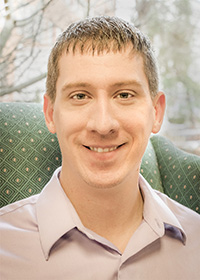
Miami alumnus receives highest U.S. award for early-career scientists and engineers

Matthew Wheeler
by Claire Wagner, University News and Communications
Matthew Wheeler, a Miami graduate and independent researcher at the Centers for Disease Control and Prevention, has received the Presidential Early Career Award for Scientists and Engineers (PECASE), the highest honor bestowed by the United States government on science and engineering professionals in the early stages of their independent research careers.
President Barack Obama honored 102 scientists and researchers who work at federal agencies this month for “working to help keep the United States on the cutting edge, showing that federal investments in science lead to advancements that expand our knowledge of the world around us and contribute to our economy.”
Wheeler earned his bachelor’s of science in systems analysis in 2000 and his master’s in statistics at Miami in 2002 before earning a doctorate in biostatistics from the University of North Carolina. As an undergraduate doing research with Michael Zmuda, associate professor in computer science and software engineering, Wheeler worked on color computer image processing using a technique called "mathematical morphology," out of which a manuscript was published in Proceedings National Aerospace and Electronics Conference in 2000.
As a master’s student working with John Bailer, chair and University Distinguished Professor of Statistics, “we looked at the statistical properties of an estimator used in aquatic toxicology. This research lead me to my current position at the National Institute for Occupational Safety and Health (an agency of the CDC) and focus on machine learning methods for chemical risk assessment,” said Wheeler.
– Matt Wheeler
“My current research dovetails into both of these fields, i.e., statistical machine learning and chemical risk assessment. I owe a lot to Drs. Zmuda and Bailer for advising me and stoking my interest in both computing and statistics. They are also responsible for me furthering my education.”
Bailer and Wheeler co-authored a paper examining the viability of alternative risk assessment methods for assessing risks from environmental and occupational exposures. It earned the CDC’s 2014 Charles C. Shepard Science Award in the category of data methods and study design.
“It was clear that Matt was going to be a successful scholar,” said Bailer. “He may be the only master's student with two scientific publications produced during his time at Miami. I'm happy to say that Matt and I continue to collaborate on research questions 17 years after we first met when Matt was a student in a regression class.”
"I was fortunate to have Matt in several of my classes and as a student researcher," said Zmuda. "In 1999, I saw Matt talk about ideas outside typical classroom discussions and then start working on those ideas. Very few undergraduate students exhibit this characteristic, yet Matt could do it very well. It is very satisfying to see Matt achieve this recognition."
Wheeler’s work at NIOSH involves having developed several approaches to probabilistic risk assessment, which allow risk assessors and risk managers to more reliably estimate the true risk of populations exposed to chemical agents.
Most recently, he has developed novel methods for estimating the adverse response to chemical hazards for any dose, in vitro, using only the chemical structure information, a method in statistical machine learning.
“For chemical risk assessment, this work, if replicated and extended, has the potential to be a ground-breaking development; primarily because it allows one to estimate chemical responses across a range of doses instead of a single dose, now the current standard, and develop methods of chemical toxicity screening before the chemical is even developed, which is obviously of great benefit to occupational safety and health,” added Wheeler.
The awards, established by President Bill Clinton in 1996, are coordinated by the Office of Science and Technology Policy within the Executive Office of the President. Awardees are selected for their pursuit of innovative research at the frontiers of science and technology and their commitment to community service as demonstrated through scientific leadership, public education or community outreach.
